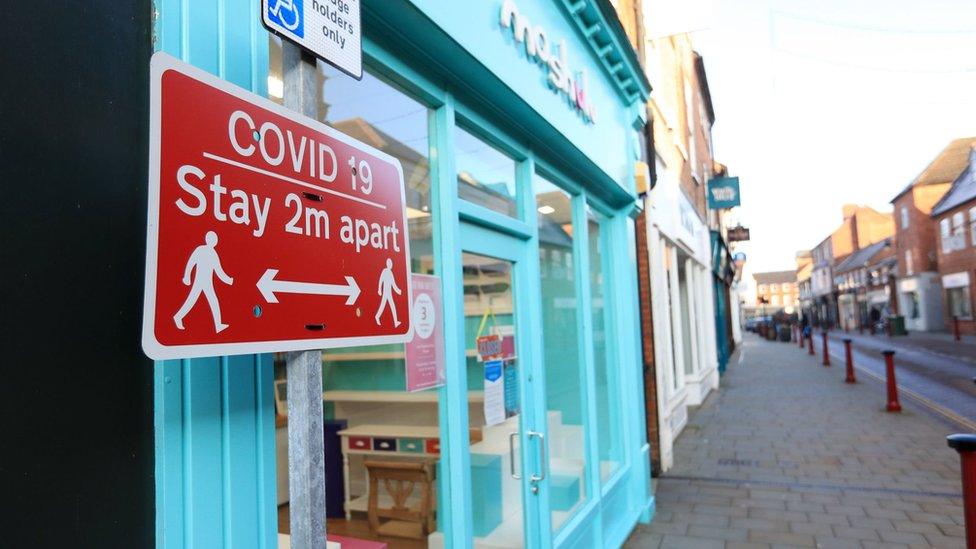Coronavirus: New lockdowns for England and Scotland
- Published
- comments

New national lockdowns have been announced for England and Scotland.
The stricter rules are being described as similar to those which were in force in March last year.
People are being told to stay at home and all schools will now close for most pupils.
Prime Minister Boris Johnson said the restrictions in England start immediately. Schools will shut from Tuesday 5 January until mid-February.
It's after First Minister Nicola Sturgeon announced a similar lockdown for Scotland which will last until 1 February.
Why are there new lockdowns?
The PM said it is "frustrating and alarming" to see the speed at which a new variant of the virus is spreading.
It's hoped the tougher rules will help stop the spread of the coronavirus after a sharp rise in cases and that it will also help protect the NHS from being overwhelmed.
It's as the UK's chief medical officers and NHS England's medical director have recommended that the UK Covid alert level should move up to level five - that's the highest level and means there is now a risk of the NHS being overwhelmed.
This is based on the number of confirmed cases and the R number (a scientific measure of how fast the virus is spreading), and is different to the tier systems.
WATCH: What is the R number?
What are the new lockdown rules for England?
Prime Minister Boris Johnson's announcement of England's third lockdown was broadcast on TV
People in England are being told to stay at home, except for limited reasons including shopping for essentials such as food.
People who are clinically extremely vulnerable are also being advised to start shielding again.
All schools will close and move to remote learning. Vulnerable pupils and children whose parents are key workers will still be able to go to school.
In England and Scotland all schools are shutting for most pupils, with learning going online
Exercising outside is allowed once a day, but venues such as gyms, tennis courts and golf courses will be closed.
Professional sport in England can continue behind closed doors.
Are there any positives?
Mr Johnson stressed "one huge difference" between this new lockdown and the one in March last year - the rolling out of "the biggest vaccination programme in our history".
The PM said that by the middle of February, "if things go well", the government expects to have offered a first vaccine dose to everyone in the four top priority groups.
These groups include all residents in care homes for older adults and their carers, everyone over the age of 70 and all frontline health and social care workers.
By vaccinating vulnerable people in those groups, he said "that will eventually enable us to lift many of the restrictions we have endured for so long".
He also added that "thanks to the miracle of science, not only is the end in sight but we know exactly how we will get there".
What are the new lockdown rules in Scotland?
The first minister announced that tougher restrictions would be introduced at midnight on 4 January
Scottish First Minister Nicola Sturgeon announced the new lockdown on Monday 4 January.
She said the rules will be kept under review, but that she can't rule out having to make further changes or make them last longer.
It is illegal for people in Scotland to leave their homes unless it is for an essential purpose, such as exercise, essential shopping and caring duties.
All schools will stay shut until the beginning of February at least.
People have been asked to work from home where they can.
Places of worship will be required to close.
A maximum of two people from two different households will be able to meet outdoors - this only applies to people aged 12 and over.
Essential shops, such as supermarkets, will be able to stay open.
Children whose parents aren't in the same household - that means they don't live together - can still go between their parents' homes.
Professional sport in Scotland will not be affected by new coronavirus restrictions for now.
Wales has had tougher rules since 20 December when it went into a national lockdown.
In Northern Ireland, a meeting between ministers at Stormont has been held late on 4 January about the possibility of further restrictions.
The First Minister, Arlene Foster, has already said "difficult decisions" will need to be made.
- Published5 January 2021
- Published6 January 2021
- Published4 January 2021
- Published4 January 2021
- Published7 June 2021
